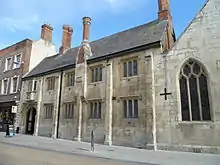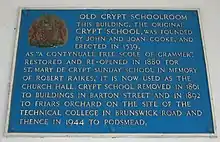The Crypt School
The Crypt School is a grammar school with academy status for boys and girls located in the city of Gloucester. Founded in the 16th century, it was originally an all-boys school, but it made its sixth form co-educational in the 1980s and moved to a mixed intake from year 7 in 2018, thereby becoming the only fully coeducational selective school in Gloucester. The school was founded in 1539 by Joan Cooke with money inherited from her husband John.[1]
| The Crypt School | |
|---|---|
| Location | |
| , , GL2 5AE England | |
| Coordinates | 51.8394°N 2.252°W |
| Information | |
| School type | Grammar school; Academy |
| Motto | Floreat Schola Cryptiensis |
| Established | 1539 |
| Founders | John and Joan Cooke |
| Department for Education URN | 136578 Tables |
| Ofsted | Reports |
| Head teacher | Nicholas Dyer |
| Gender | Fully coeducational from September 2018 (mixed) |
| Age | 11 to 18 |
| Number of students | 1,048 |
| Houses | Cooke (Formerly Brown), Waboso (Formerly Whitefield), Moore, Raikes and Henley |
| Colour(s) | Maroon, Primrose |
| Website | http://www.cryptschool.org/ |
%252C_and_Joan_Cooke_(d.1545).jpg.webp)


History
Founders
John Cooke (d. 1528) was a wealthy brewer and mercer of Gloucester, one of the city's earliest aldermen, serving as sheriff in 1494 and 1498. He held the office of mayor four times, in 1501, 1507, 1512 and 1518. He was a significant benefactor in the city during his life, but it was his will that started the process for the establishment of a grammar school in Gloucester. The scheme was given effect by his wife Joan Cooke, who survived him by 17 years, dying in 1545.[2] It was Joan therefore who created the tripartite deed of 1539, deemed to be the founding charter. The school remains today the most ancient in Gloucester.[1] A full account of the couple and their good works is described in the book by Roland Austin published in 1939 "Crypt School".[3] A portrait of the pair painted some years after Joan's death is extant.[2] It shows John in his mayoral robe, shaking hands with Joan and it is in the collection of Gloucester City Council.[1]
Site
In the school's 500-year history it has been sited in three different locations within the city of Gloucester. The original school was part of St Mary de Crypt Church in Southgate Street and the schoolroom can still be seen there.[4] Later, in 1889, the school moved to Greyfriars, known better as Friar's Orchard,[5] and in 1943, to its present site at Podsmead. The site on which the modern school is situated is land given to the school by Joan Cooke in 1539.
Status
Despite attempts to change the school, notably in the 1960s with the move to comprehensive schools, the Crypt remains a selective grammar school. In 1987, there was the admission of girls in the sixth form entering in at the age of 16, and the transition towards a fully coeducational school began in 2018.[6] Since April 2011, the school has been an academy independent of local authority control. The school has been fully co-educational since 2018.[7]
Primary school
In May 2018, the school announced plans to create a primary school, linked to the secondary school being built on the current Podsmead site. The new primary school would, unlike main school, be unselective and would be a free school.[8]
Facilities
Facilities at the school include:[9]
- Largest non-commercial stage in Gloucestershire
- Sixth Form Centre (also known as John and Joan Cooke Centre)
- Sports hall[9]
- Modern Pavilion
- New Tennis and Netball courts as of 2019/20
- 3 full-size rugby pitches
- 2 football pitches
- 2 cricket fields (1 natural green, 1 artificial green)
- Anthony Iles Block (Formerly Engineering Block)
Notable alumni
- Alumni of the school are known as Old Cryptians.[10]
Religion
- Michael Wrenford Hooper, Bishop of Ludlow from 2002 to 2009
- John Moore (1730–1805), Archbishop of Canterbury
- John Paddock (8 August 1951 - 5 June 2023), Dean of Gibraltar (2008-)
- Robert Raikes (1736–1811), publisher and founder of Sunday School Movement
- George Whitefield (1714–1770), a leader of the Methodist movement
- James Frederick Wood, Archbishop of Philadelphia between 1860 and 1883
- James Roose-Evans, theatre director and priest
Sports
- John Gordon A'Bear, international rugby union player with the British and Irish Lions, and Gloucester's youngest ever captain.
- Charlie Hannaford, England rugby union international
- Grahame Parker, cricketer
- Wayne Thomas, professional footballer (Doncaster Rovers)
- Percy Stout, England rugby union international
Academia
- Ernest Baldwin, professor of biochemistry at University College London from 1950 to 1969
- Peter Bayley, professor of English at the University of St Andrews from 1978 to 1985, and the first Principal of Collingwood College, Durham in 1972
- Derek Brewer, professor of English at the University of Cambridge from 1983 to 1990, Master of Emmanuel College, Cambridge from 1977 to 1990, and president of the English Association from 1982 to 1983 and 1987 tp 1990
- Thomas Edward Brown (1830–1897), poet, scholar, and head-master
- H. D. F. Kitto, classicist and professor of Greek at the University of Bristol from 1944 to 1962
Arts
- Capel Bond, organist
- Ian Dench, musician, best known as the guitarist from EMF
- Michael John Hurd, composer
- William Henley (1849–1903), poet and editor
- Anthony Calf, actor
Politics
- Harold Collison, Baron Collison CBE, general secretary of the National Union of Agricultural and Allied Workers from 1953 to 1969
- Robin Day (1923–2000), journalist, broadcaster and political commentator
- James Bruton, member of Parliament for Gloucester for the Unionist Party in 1918 and 1922
Other
- Ian Bailey[11]
- Saajid Badat ,British terrorist [12]
School song
'Carmen Cryptiense', written in April 1926 with words by D. Gwynne Williams (Headmaster) and music by C. Lee Williams.[13]
References
- John and Joan Cooke. Archived 2011-07-17 at the Wayback Machine Living Gloucester, 2011. Retrieved 23 June 2011.
- Litzenberger, Caroline (28 September 2006). "Cooke, John (d. 1528), mercer and benefactor". Oxford Dictionary of National Biography (online ed.). Oxford University Press. doi:10.1093/ref:odnb/94981. ISBN 978-0-19-861412-8. Retrieved 28 November 2022. (Subscription or UK public library membership required.)
- Gray, Irvine Egerton (1981). Antiquaries of Gloucestershire and Bristol. Bristol and Gloucestershire Archaeological Society. ISBN 978-0-900197-14-7.
- "Gloucester: Education Pages 335-350 A History of the County of Gloucester: Volume 4, the City of Gloucester". British History Online. Victoria County History. Archived from the original on 24 August 2019. Retrieved 30 August 2020.
- "Gloucester: Sites and remains of religious houses Pages 288-292 A History of the County of Gloucester: Volume 4, the City of Gloucester". Victoria County History. Archived from the original on 6 October 2019. Retrieved 30 August 2020.
- "The Crypt School : Gloucester". www.cryptschool.org. Archived from the original on 28 May 2018. Retrieved 26 May 2018.
- "The Crypt School : Gloucester". cryptschool.org. Archived from the original on 8 May 2016. Retrieved 7 May 2016.
- Lane, Ellis (21 May 2018). "Historic secondary school plans to open feeder primary". gloucestershirelive. Archived from the original on 27 May 2018. Retrieved 26 May 2018.
- "The Crypt School : Gloucester". www.cryptschool.org. Archived from the original on 27 May 2018. Retrieved 26 May 2018.
- "The Old Cryptians' Club – Home". Archived from the original on 25 April 2006. Retrieved 13 March 2006.
- "Yearning for 'a different life' brought Bailey to west Cork". Irish Times. 6 November 2014.
- "Saajid Badat the walking angel who became a terrorist". The Telegraph. 16 April 2012.
- "School Song – Scanned Front Page « Old Cryptians". www.oldcryptians.org. Archived from the original on 27 May 2018. Retrieved 26 May 2018.
External links
- Official website
- Old Cryptians Club for former pupils and teachers.
- The London Old Cryptians Club